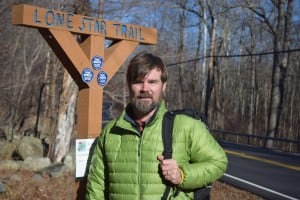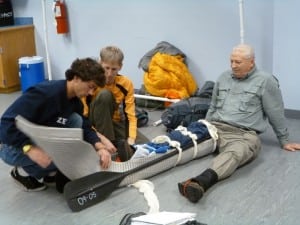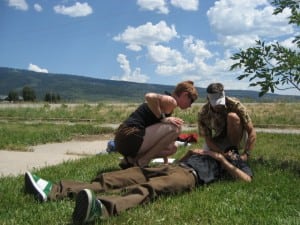Cold Spring firefighter to offer course in wilderness first aid
By Michael Turton
Injuries on area hiking trails are not uncommon and a Nelsonville resident wants to make sure outdoor enthusiasts are qualified to help victims receive proper medical treatment.
Matt Kane is a member of the Cold Spring Fire Company, and is one of dozens of first responders who came to the aid of two stranded hikers during a dramatic rescue on New Year’s Eve north of the village. Neither hiker was seriously injured, but had they been, Kane, a certified Wilderness Emergency Medical Technician, was ready to render first aid. He is launching a program through which he will pass some of that knowledge to others, especially those who enjoy hiking, canoeing, kayaking, camping, hunting and fishing.
On Saturday, Jan. 23, and Sunday, Jan. 24, Kane will lead a two-day course on wilderness first aid at the Taconic Outdoor Education Center (TOEC) with Todd Johnston Wright, director of outdoor education at St. Michael’s College in Colchester, Vermont. It will entail training in the essential areas that first aid providers need to consider when treating injuries outdoors. “It will cover all the basics,” he said. “That includes response and assessment of a victim’s condition, traumatic injuries, environmental injuries, and soft tissue and medical injuries.” Training in CPR and use of an Automatic External Defibrillator (AED) will also be offered as an option on Saturday evening.

Kane, who owns and operates Prime Paddlesports (primepaddlesports.com), said TOEC is an excellent venue for the course. “We’ll do basic training inside, then send participants outside where they’ll have to deal with various first aid scenarios” in authentic settings, he said. TOEC also has cabins which can be used overnight by out-of-town participants. Kane, who is very involved within the tristate paddling community, said a number of canoeists and kayakers from Connecticut, New Jersey and other parts of New York have already enrolled.
Learn to improvise
An underlying theme on both days, Kane said, will be to remind participants that they must be properly equipped and prepared to deal with the unexpected whenever heading out on area trails or on the Hudson River. In wilderness first aid, learning how to improvise using available materials is an invaluable skill. “You need to learn to use what you have with you, whatever is in your pack,” he said. “A kayak paddle or hiking pole can be used as part of an improvised splint when treating an injured arm or leg.”

Ideally, he said, someone rendering first aid in the outdoors would have disposable rubber gloves in their pack to protect against infectious disease agents when coming in contact with an injured person. “But you can also improvise by using zip-lock bags,” Kane said. “Take a look at what’s in your pack,” and ensure it’s well stocked, he said. He also recommends sealing important pack items in waterproof containers whenever possible.
The TOEC-based course will cover the gamut of injuries and scenarios that first aid providers may come across when outdoors, from cuts, bruises, sprains and fractures to hypothermia, heat exhaustion, dehydration, insect and snake bites and seizures. “It’s a lot of information in a two-day course,” Kane said. As with any skill, first aid requires updating on a regular basis. “You have to go back periodically,” he said. “If you learn navigation skills but haven’t used them in three years, you have to take a refresher course.”
More programs planned
Kane will offer a second Wilderness First Aid program in March and he hopes to add a third course in June aimed at camp counselors. He also hopes to offer the more comprehensive Wilderness First Responder program. Kane said that ultimately he would like to see his training program produce a contingent of well-trained Philipstown residents who can be actively involved as volunteers, offering aid to those injured on area trails and other outdoor settings.

The fee for the Wilderness First Aid program is $200, with optional CPR/AED training available for an additional $50. The certification, provided by the New Hampshire-based SOLO (soloschools.com), is valid for two years. Participants should dress appropriately for the outdoors in January and bring a bag lunch as well as their outdoor pack, whether it’s for hiking, paddling, skiing or hunting. Those completing the course will receive a copy of SOLO’s Field Guide to Wilderness First Aid. For more information or to register, email [email protected].
